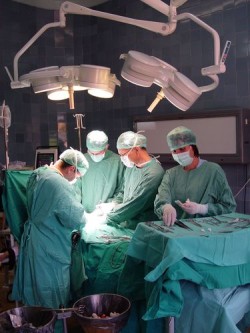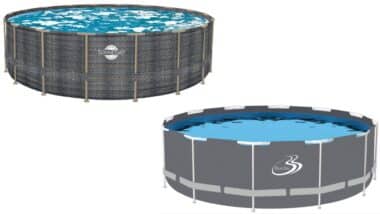 A team of Canadian researchers have published a study linking the use of power morcellators in hysterectomy and fibroid removal surgery with a possible increased risk of uterine sarcoma and parasitic fibroids.
A team of Canadian researchers have published a study linking the use of power morcellators in hysterectomy and fibroid removal surgery with a possible increased risk of uterine sarcoma and parasitic fibroids.
What Are Power Morcellators?
For many women, uterine fibroids cause problems, including heavy uterine bleeding, pelvic pain, and infertility. In these cases removal of the fibroids, either by myomectomy or by hysterectomy, is a common treatment.
Power morcellators permit the removal of very large uterine fibroids through small laparoscopic surgery incisions with faster healing and recovery time.
However, power morcellators are under close scrutiny by the medical community and the FDA after many women have started to file morcellation cancer lawsuits, alleging the medical tool causes undetected cancer cells to spread and may also lead to parasitic fibroids.
Power Morcellation Risks
A study published in the American Journal of Obstetrics & Gynecology adds more evidence that power morcellators pose life-threatening safety risks for women.
The researchers evaluated data on over 3,500 women who had a hysterectomy between 2001 and 2012, including 941 women who were treated with a power morcellator.
Almost immediately after the morcellator procedure, pathologists diagnosed three women with cancer by looking at tissues that were removed in the hysterectomy.
In another three cases, the women were diagnosed soon afterward. None of the women had symptoms of cancer before the procedure. The only reliable way to diagnose uterine sarcoma is by examining tissue after it is removed from the body.
In the past, experts thought the risk of power morcellators spreading cancer was low. However, the researchers found that 10 out of 941 (1.1 percent) of women were subsequently diagnosed with uterine sarcoma or a parasitic myoma, which is a benign (non-cancerous) fibroid that grows from morcellated tissue left inside the woman’s body.
The researchers estimated that uterine sarcoma would be diagnosed in 0.6 percent of women who were treated with a power morcellator during a hysterectomy. Though numerically it might seem small, the estimate is three times higher than the FDA’s estimate of one in 350 (0.2 percent).
FDA Warns Against Power Morcellator Surgery
That FDA estimate means that one in 350 women undergoing a laparoscopic hysterectomy or myomectomy for treatment of fibroids will later be diagnosed with a previously unsuspected uterine sarcoma, including leiomyosarcoma. According to the FDA, there is no reliable method to predict or test whether a woman with fibroids may also have uterine sarcoma.
Now, the FDA warns against the use of power morcellator devices on the majority of women undergoing treatment of fibroids. They have also issued a new set of guidelines and recommendations for physicians to follow when treating women with fibroids, and issued a new black box warning label for the devices to inform doctors and patients:
“Uterine tissue may contain unsuspected cancer. The use of laparoscopic power morcellators during fibroid surgery may spread cancer and decrease the long-term survival of patients. This information should be shared with patients when considering surgery with the use of these devices.”
Because of the FDA warning, women and their families are bringing morcellation lawsuits for compensation against the manufacturers of these medical devices. If you have been diagnosed with leiomyosarcoma, parasitic myoma, or any other uterine cancer following a hysterectomy or fibroid removal (myomectomy), you may be able to file a power morcellation lawsuit.
Do YOU have a legal claim? Fill out the form on this page now for a free, immediate, and confidential case evaluation. The morcellation cancer attorneys who work with Top Class Actions will contact you if you qualify to let you know if an individual lawsuit or class action lawsuit is best for you. [In general, morcellator cancer lawsuits are filed individually by each plaintiff and are not class actions.] Hurry — statutes of limitations may apply.
ATTORNEY ADVERTISING
Top Class Actions is a Proud Member of the American Bar Association
LEGAL INFORMATION IS NOT LEGAL ADVICE
Top Class Actions Legal Statement
©2008 – 2026 Top Class Actions® LLC
Various Trademarks held by their respective owners
This website is not intended for viewing or usage by European Union citizens.
Get Help – It’s Free
Join a Free Morcellation Cancer Class Action Lawsuit Investigation
If you or a loved one were diagnosed with cancer in the uterus, pelvis or abdomen within two years of undergoing surgery for a myomectomy (removal of fibroids), hysterectomy (removal of the uterus), oophorectomy (removal of the ovaries), or salpingectomy (removal of fallopian tubes), you may have a legal claim. See if you qualify by filling out the short form below.
An attorney will contact you if you qualify to discuss the details of your potential case at no charge to you.
Oops! We could not locate your form.












